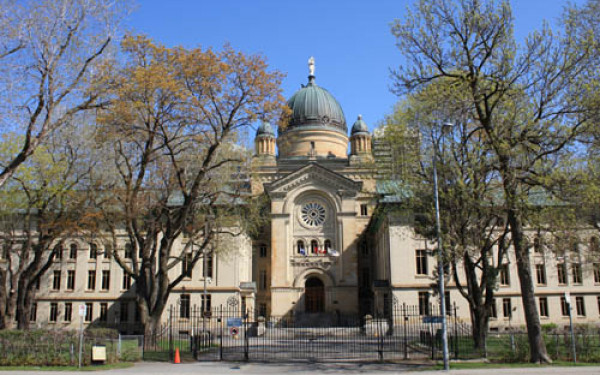Canadian Federation of Students Loses in Court to Former Provincial Wing
The fourth chapter in the lengthy and ongoing legal battle between Quebec student associations and the Canadian Federation of Students has come to an end.
Quebec Superior Court judge Claude Dallaire was tasked with determining who was acting as the legitimate provincial wing of the CFS—and thus entitled to portions of the membership fees paid by student associations—between the spring of 2007 and May 14, 2010.
In a victory for Quebec student associations trying to dissociate themselves from the CFS, Dallaire ruled in a declaratory judgment on Friday that the Rassemblement des associations étudiantes, formerly known as CFS-Quebec or CFS-Q, is entitled to the membership dues collected on behalf of the CFS’ provincial wing during that time period.
She also declared that the RAE is entitled to one-sixth of the national membership dues collected by the CFS from Quebec student associations, as per the CFS’ own rules.
“Given that the [national CFS] recognized that the CFS-Q only ceased to be the organization’s legitimate provincial wing in May 2010 in the transaction that interests us, and since the CFS-Q was, in fact, continuing to act as such until May 14, 2010, to the knowledge of the CFS-N, the CFS-Q had the right to receive all the fees to which a provincial component of the CFS-N has the right under the latter’s regulations,” she wrote.
The RAE is composed of the Concordia Student Union, the Concordia Graduate Students’ Association, the Dawson Student Union and the Post-Graduate Students’ Society of McGill University. All four student associations have tried to disaffiliate from the CFS.
“The RAE is pleased that the court recognized its right to membership dues that the CFS was claiming without justification. We are looking forward to returning these fees to member student associations in Quebec,” said RAE director Jonathan Mooney.
Mooney added that the case has serious implications for the CSU and the GSA, since the CFS is claiming that the two student associations owe the CFS about $3 million in unpaid fees.
“Because of the RAE victory, if the CFS succeeds with even part of this claim, a good portion of money would go to the RAE instead of the CFS and thus be returned to the CSU and GSA. It could amount to hundreds of thousands of dollars saved by the CSU and GSA,” he said.
Although it was incorporated in 1998, problems only began to arise in CFS-Q—the national lobby group’s provincial wing—in 2007, when fights over leadership positions between two factions led a judge to order a provisional freeze of all of the organization’s activities.
With CFS-Q paralyzed, a proposal was passed at the CFS’ annual general assembly in November 2007 to form a new provincial wing under the name CFS Élément-Québec. CFS-Q eventually renewed operations, but was faced with a new round of leadership squabbles in July 2009. Then, three executives refused to leave their positions, and rejected their replacements.
Seeing what happened in the summer of 2009 and noting that some CFS-Q executives were now inciting member associations to disaffiliate from the national lobby group, CFS decided that CFS-Q was no longer fulfilling its goal and started to take measures to dissociate itself from the provincial wing, alleging that its representatives were working counter to the national organization’s interests.
“We held a referendum to disaffiliate from the Canadian Federation of Students and the [CFS] is not respecting our local sovereignty, […] you can rest assured that we are committed to ensuring that the referendum that we held is respected.”
– Benjamin Prunty, CSU President
In January 2010, the CFS initiated legal proceedings seeking to prevent the CFS-Q from using its name and trademark and from receiving the provincial component of CFS membership fees. The CFS and CFS-Q reached a deal that led to both organizations officially dissociating from one another on May 14, 2010, with the former provincial wing being renamed the RAE in June of that year.
In finding that CFS-Q was indeed the CFS’ provincial wing until May 2010, Dallaire rejected the national lobby group’s argument that it ceased to serve as the provincial wing during the “untenable situation” in the summer of 2007, when a safeguard order was issued prohibiting the two opposing factions from accessing CFS-Q’s offices.
Dallaire notes that the CFS continued to send “important sums to CFS-Q to continue its operations” and also was aware of the CFS-Q’s move to new offices in March 2008, with the lease agreement being signed in the national lobby group’s name.
“The only conclusion to arrive at is that, during this period from February 2008 to 2009 […] the CFS-Q was well and good representing the interests of the Quebec members of [the national CFS],” she wrote.
The judge also rejected the CFS’ requests to be reimbursed by the RAE for $50,000 that it had given to CFS-Q in February 2010 for its activities, as well as its request to be compensated for $14,000 paid for the CFS-Q’s rent between 2007-2010.
The court case opposing the CFS and the CFS-Q is but one of six court cases that have been brought forward between the national lobby group and Quebec student associations. It is the fourth case to conclude, while two cases have still not been heard by the courts.
A trial will begin in the winter of 2015 to address a joint lawsuit by the CSU and the GSA against the CFS over the national lobby group’s refusal to recognize votes held at Concordia that found both undergraduate and graduate students were in favour of severing ties with the organization.
“We held a referendum to disaffiliate from the Canadian Federation of Students and the [CFS] is not respecting our local sovereignty and our legal authority to decide whether or not we would be members of their alleged federation,” CSU President Benjamin Prunty told The Link on Friday.
“It’s a legal case, so there’s not a lot that we can talk about publicly, but you can rest assured that we are committed to ensuring that the referendum that we held is respected.”
The national CFS was founded in 1981 and brings together roughly 80 student associations at the post-secondary level, representing roughly half a million people.





_.final_._jpg__600_375_s_c1.png)

